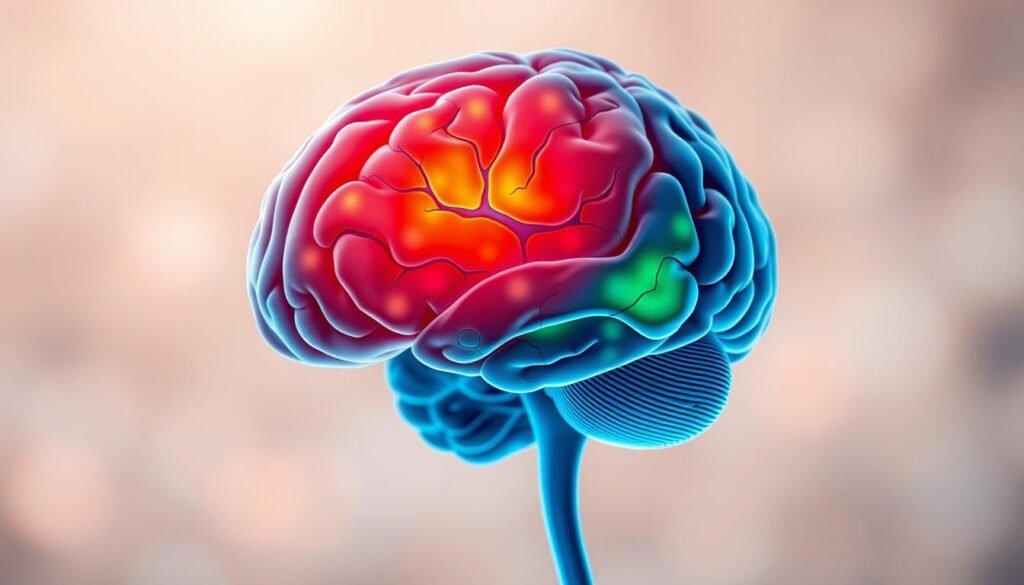Have you ever thought about how depression quietly changes a person’s mind? It does more than make people feel sad. It changes how the brain works. This affects thinking and feeling. In the U.S., about 17 million adults struggle with depression. This can change the brain’s structure and how it communicates. It can also make it hard to manage emotions.
It’s important to understand depression’s impact on the brain. This knowledge helps those suffering and society. Neuroscience has revealed how mental health and brain function are connected. It highlights the need for awareness and treatment. The study of depression shows its deep effects on the mind and body. It touches on everything from brain flexibility to thinking problems.
Key Takeaways
- Depression can lead to a loss of gray matter volume in key brain areas.
- Severe depression is linked to greater cognitive impairments.
- Cerebral inflammation may hinder neuroplasticity, affecting recovery and adaptation.
- Long-term depression correlates with increased brain shrinkage and inflammation.
- Effective treatments can promote new brain connections and enhance mental health resilience.
Understanding Depression and Its Prevalence
Understanding depression is key because it’s a common mood disorder worldwide. In the US, about 3 in 10 adults will deal with depression at some point. About 18% are fighting this condition right now. It’s a top cause of disability globally and ranks third in contributing to the global burden of disease.
Symptoms range from feelings of sadness to emptiness. People may lose interest in their favorite activities, have appetite and weight changes, and feel very tired. Many also find it hard to focus, feel worthless or guilty, and may think about suicide. Spotting these signs early and getting help is critical for recovery.
Many factors lead to depression, including stress, low self-esteem, and genetics. Being in violent, neglectful, or impoverished situations can also raise the risk. Effective treatments like therapy and medicine help 70% to 90% of people improve.
The way we understand and treat depression gets better over time, thanks to research. Studies on brain function show altered areas, like the prefrontal cortex and the hippocampus. This helps us see depression as a condition that can and should be treated. For more information on treatments and support, you can visit this resource.
Symptoms and Signs of Depression
Knowing how to spot depression signs is key to get help early. People with depression face many emotional, physical, and behavioral symptoms. You might feel very sad, lose hope easily, or get irritated quickly.
Changes in your sleep or appetite can be signs too. You might sleep too little or too much. And you might feel really tired, even if you slept well. Losing interest in things you used to like is common too.
Trouble focusing or making decisions can also happen. Depression affects everyone differently, so the signs can vary.
In older adults, look for sleep issues, tiredness, and lots of worries about health. Two-thirds of depressed people also feel more pain than usual. Knowing these signs helps us understand what someone is going through.
If you notice these symptoms, getting help early can make a big difference. Places like the Mayo Clinic offer advice on treatments. It’s important to reach out for professional support.
| Symptoms of Depression | Related Indicators |
|---|---|
| Persistent sadness | Feelings of hopelessness |
| Changes in sleep patterns | Insomnia or hypersomnia |
| Appetite fluctuations | Weight gain or loss |
| Fatigue | Lack of energy |
| Diminished interest in activities | Social withdrawal |
| Difficulty concentrating | Memory problems |
The Impact of Depression on the Brain
Depression doesn’t just change how we feel. It can physically change our brains. The changes include less gray matter and messed up neurotransmitters. Understanding this helps us see how depression works inside us.
Reduction in Gray Matter Volume
Depression often leads to less gray matter in key brain regions. For example, the hippocampus gets smaller. This area is key for memory and making decisions. Cortisol, a stress hormone, is a big reason for this shrinkage.
This loss affects how we think and manage emotions, making depression’s challenges even harder.
Neurotransmitter Imbalances
Depression messes with important brain chemicals like serotonin, norepinephrine, and dopamine. This causes mood problems. This can start a tough cycle, where feeling bad messes up these chemicals even more.
Fixing these imbalances is vital for getting better. It helps the brain work right again. For more info, check out this link.
Brain Changes Associated with Depression
Depression brings critical changes to the brain, affecting its structure and function. Studies show important areas like the hippocampus, amygdala, and prefrontal cortex shrink. This can cause deep cognitive and emotional problems for those with major depressive disorder (MDD).
Shrinkage of Key Brain Areas
Chronic depression often leads to a smaller hippocampus. This affects memory and learning. The longer and more severe the depression, the more it shrinks.
Other areas like the thalamus and caudate nucleus also get smaller, hurting cognitive abilities. Mood regulation areas thin out, making sadness and hopelessness worse.
Effect on the Amygdala
The amygdala changes in depression, leading to emotional challenges. For some, it gets bigger, causing mood swings and anxiety. These changes make depression symptoms stronger, creating a tough cycle to break.

Brain Inflammation and Depression
Recent studies have found a big link between brain inflammation and depression. This tells us that long-term inflammation can really affect our mental health. People with ongoing depression often have higher levels of certain proteins. These proteins show there might be brain inflammation.
This inflammation could change how the brain works and grows. It’s an important area for research, especially for understanding depression better.
Link Between Inflammation and Neuroplasticity
Neuroplasticity is vital for getting over depression. But, if the brain is inflamed, it harms this process. The brain struggles to make new neurons or connections. This makes it hard for people to recover from depression.
When neurons get damaged by constant inflammation, it affects thinking and emotions. It leads to a rise in stress hormones too, which makes mental health issues worse.
Consequences of Chronic Brain Inflammation
Long-term brain inflammation harms those with depression a lot. It makes it hard for them to think or focus. High levels of inflammation markers in blood tests show a strong link to how serious the depression is.
People with serious depression have about 30% more brain inflammation. This can make their symptoms worse and create a cycle of poor mental health. That’s why treating inflammation might help manage depression better.
Cognitive Impairments Linked to Depression
Depression affects many parts of life, especially our thinking abilities. People with depression often find it hard to remember things or focus. These problems can really disrupt daily activities.
Memory Issues and Recall Problems
For those facing depression, forgetting things is common. They struggle to remember information or complete tasks. Studies show many with depression, about 85% to 94%, have these issues when they’re feeling low. Around 39% to 44% still face these troubles even when they feel better. So, trouble with thinking due to depression can really affect someone’s life for a long time.
Difficulty in Concentration and Decision Making
Depression also makes it hard to concentrate. This makes deciding things difficult. Even when people start to feel better from their depression, they might still find concentrating hard. This problem can make work and daily tasks challenging. Many with depression say these thinking problems affect their job. It shows how closely linked trouble with focusing is to struggles in daily life.

| Cognitive Impairment Type | Duration of Symptoms | Impact on Daily Living |
|---|---|---|
| Memory Issues | Common during depressive episodes, some persist in remission | Challenges in retrieving information and task performance |
| Concentration Difficulties | Ongoing, even post-remission | Interference with work and decision-making |
| General Cognitive Impairment | 85%-94% during episodes, 39%-44% during remission | Significant impact on function and quality of life |
Emotional Dysregulation in Depression
Depression can lead to emotional dysregulation. This means big swings in mood and strong emotional reactions. People facing these issues might swing wildly from happy to sad. Because of this, interacting with others and maintaining relationships can become hard.
The amygdala, key for emotion, grows bigger with depression. This makes emotions harder to control. By understanding emotional dysregulation, people can better handle their feelings and connect with help.
Depressed people might ruminate or push down emotions. These methods worsen mood instability, adding to guilt and hopelessness. Trouble processing negative info makes things worse.
Mindfulness and emotion-focused therapy can help with emotional control. They teach individuals to spot and change bad emotional habits into good ones.
Knowing more about emotional dysregulation helps people find the right help. This leads to healthier emotional reactions and better mental health overall.
Stress Response and Its Effects on Mental Health
Our bodies react to stress in ways that affect our health and happiness. Too much stress can make depression worse and change how our brains work. It leads to a faster heart rate and weaker immune system.
Too much stress over time can actually change the structure of our brains. This is especially true in areas like the prefrontal cortex and limbic system. People with long-term stress from work might see their brains shrink in important places. This can make it hard to think clearly and feel more depressed.
Stress can cause ongoing mild inflammation that makes us prone to getting sick. It affects more than just our mood. It can lead to heart problems, stomach troubles, and even weight gain. This kind of inflammation can also harm our brain health, changing our mood and memory.
Chronic stress can cloud our thinking and make choices difficult. It often makes people feel more anxious, easily upset, and pessimistic. It’s important to see how stress impacts our mental well-being to effectively deal with it.
To handle stress better, it’s key to have good coping methods. Things like staying active, eating well, and having hobbies help lessen stress’s negative effects. Talking to a therapist can also provide strong support in fighting the mental health issues stress can cause.
| Stress Response Effects | Mental Health Impact |
|---|---|
| Increased heart rate | Anxiety and panic attacks |
| Decreased immune function | Increased susceptibility to illness |
| Cognitive impairments | Memory issues and difficulty concentrating |
| Chronic inflammation | Worsening depressive symptoms |
| Structural brain changes | Risk of neurodegenerative diseases |
Treatment Options for Depression Related Brain Changes
Treatment for depression includes many strategies. These strategies help tackle the brain changes linked to depression. Together, medication and new methods aimed at improving brain flexibility can make a big difference. This understanding can help those suffering from depression feel better.
Medications and Neurotransmitter Regulation
Medications are vital in fixing neurotransmitter issues seen in depression. Drugs like citalopram (Celexa), escitalopram (Lexapro), and sertraline (Zoloft) are popular. They have less severe side effects. Another choice is serotonin-norepinephrine reuptake inhibitors (SNRIs) like duloxetine (Cymbalta).
There are other drugs for those not helped by the usual ones. Yet, it’s critical to know these can raise suicidal thoughts in young adults. Checking in with a doctor regularly is crucial.
Therapies to Promote Neuroplasticity
Therapies focusing on neuroplasticity are now key in treating depression. They help the brain adjust and heal from depression’s effects. A common choice is Cognitive Behavioral Therapy (CBT). It changes negative thoughts and boosts coping skills.
Brain stimulation therapies like Transcranial Magnetic Stimulation (TMS) and Electroconvulsive Therapy (ECT) also improve brain flexibility. Such treatments help in relieving symptoms and better emotional health.
| Treatment Modality | Type | Examples | Considerations |
|---|---|---|---|
| Medications | Antidepressants | SSRIs, SNRIs, Tricyclics, MAOIs | Monitor side effects, risk of suicide in youth |
| Psychotherapy | Therapeutic Approaches | Cognitive Behavioral Therapy, Interpersonal Therapy | Focus on cognitive restructuring and coping strategies |
| Brain Stimulation | Neuroplasticity Therapies | TMS, ECT | Considered for severe or treatment-resistant depression |
| Exercise | Physical Activity | Regular aerobic and strength-training workouts | Benefits mood and overall health |
Mixing different treatments helps create a full plan. This plan works on symptoms and brain health.
Building Resilience Against Depression
Building resilience is key to improving mental health. Each year, about 18.8 million American adults battle depression. This highlights the need for better mental health strategies. Building resilience helps protect against mental health problems.
How can we build resilience? By exercising regularly, practicing mindfulness, and staying connected with people. These activities are good for both our bodies and our minds. They help us build a network of support. Having strong ties with friends and family makes it easier to deal with hard times. This support helps build resilience.
- Regular exercise: Physical activity releases endorphins, which enhance mood and reduce stress.
- Mindfulness practices: Techniques such as meditation and yoga can help individuals manage stress and maintain a calm perspective.
- Social support: Engaging with loved ones can provide comfort and foster a sense of belonging.
- Self-care: Regularly engaging in activities that bring joy is crucial for maintaining balance.
- Stress management: Learning to recognize and manage stress is essential for building resilience.
Resilience means feeling emotions like anger and grief but still going on. People who are resilient handle stress better. This leads to better mental health. Starting early and taking care of yourself always are key elements in becoming resilient.

If you’re finding things tough, it’s okay to ask for professional help. Counseling or therapy can offer personalized mental health strategies. Realizing the importance of resilience can improve your mental well-being. It can make life more fulfilling.
| Strategy | Benefits |
|---|---|
| Regular Exercise | Releases endorphins, reduces anxiety |
| Mindfulness Practices | Increases self-awareness, lowers stress |
| Strong Social Connections | Provides emotional support, fosters belonging |
| Self-Care Activities | Boosts mood, promotes relaxation |
| Stress Management Techniques | Reduces the impact of stressors, enhances coping abilities |
Conclusion
Depression affects how the brain works in complex ways. It involves our biology, minds, and how we interact with others. Around 16.2% of people will face Major Depressive Disorder (MDD) in their lives. Also, 73% of those with MDD will have it come back. This shows how big of an issue it is for our thinking and health.
Research tells us that depression changes the brain a lot. For example, having it many times can make it harder to get better. This can also lead to ongoing emotional issues. Also, more people are getting MDD, especially in groups that are at higher risk. We need to keep teaching others about mental health and getting help.
To wrap up, knowing and recognizing depression symptoms is key. This helps in building strength and getting better. With MDD becoming more common worldwide, we must understand its effect on the brain. By seeking help, those affected can start on a path to better mental health.